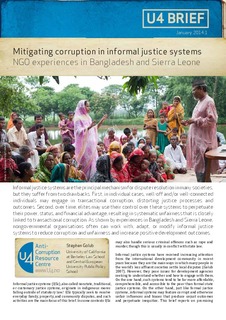Mitigating corruption in informal justice systems: NGO experiences in Bangladesh and Sierra Leone
| dc.contributor.author | Golub, Stephen | |
| dc.date.accessioned | 2018-01-04T08:18:18Z | |
| dc.date.available | 2018-01-04T08:18:18Z | |
| dc.date.issued | 2014-02-07 | |
| dc.identifier | oai:www.cmi.no:5043 | |
| dc.identifier.citation | Bergen: Chr. Michelsen Institute (U4 Brief 2014:1) 4 p. | |
| dc.identifier.uri | http://hdl.handle.net/11250/2474855 | |
| dc.description.abstract | Informal justice systems are the principal mechanism for dispute resolution in many societies, but they suffer from two drawbacks. First, in individual cases, well-off and/or well-connected individuals may engage in transactional corruption, distorting justice processes and outcomes. Second, over time, elites may use their control over these systems to perpetuate their power, status, and financial advantage, resulting in systematic unfairness that is closely linked to transactional corruption. As shown by experiences in Bangladesh and Sierra Leone, nongovernmental organisations often can work with, adapt, or modify informal justice systems to reduce corruption and unfairness and increase positive development outcomes. | |
| dc.language.iso | eng | |
| dc.publisher | Chr. Michelsen Institute | |
| dc.relation | U4 Brief | |
| dc.relation | 2014:1 | |
| dc.relation.ispartof | U4 Brief | |
| dc.relation.ispartofseries | U4 Brief 2014:1 | |
| dc.relation.uri | https://www.cmi.no/publications/5043-mitigating-corruption-in-informal-justice-systems | |
| dc.subject | Justice | |
| dc.subject | Bangladesh | |
| dc.subject | Sierra Leone | |
| dc.title | Mitigating corruption in informal justice systems: NGO experiences in Bangladesh and Sierra Leone | |
| dc.type | Report |
Files in this item
This item appears in the following Collection(s)
-
Publications [1481]
